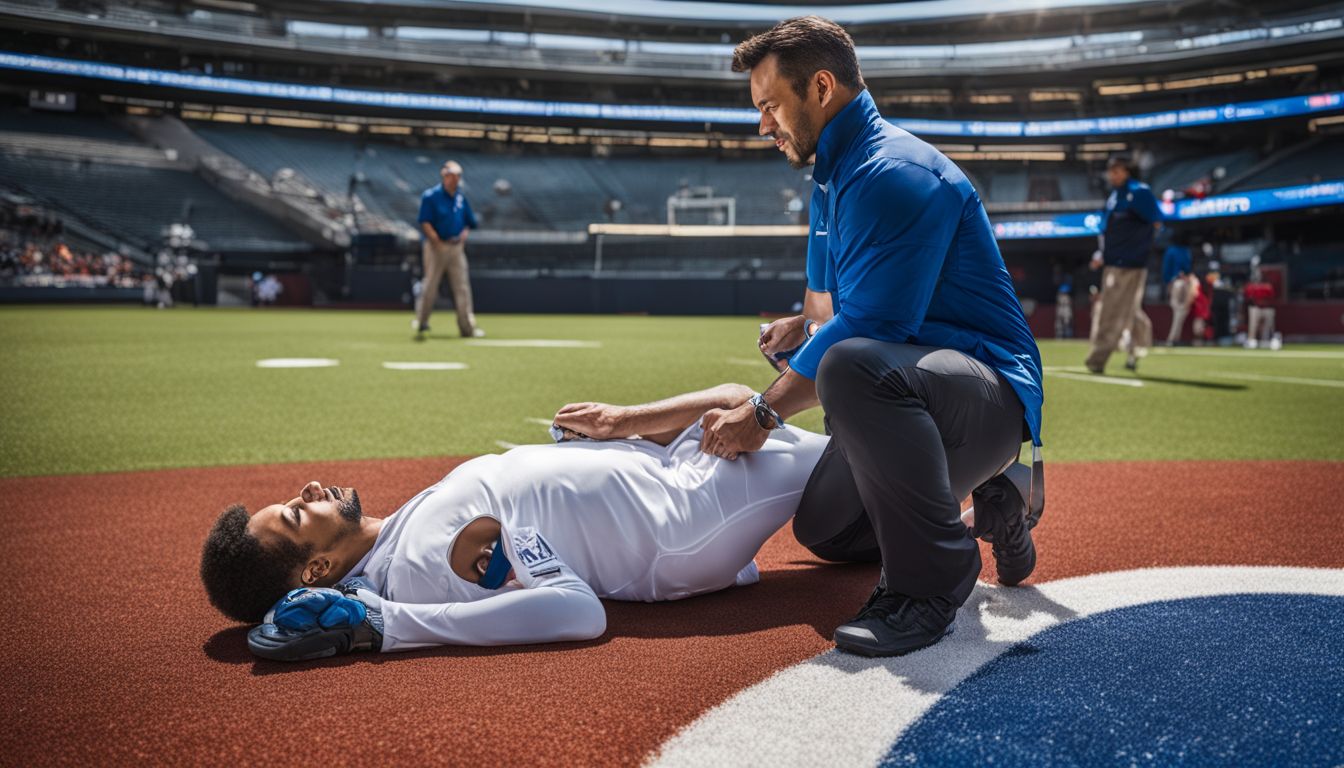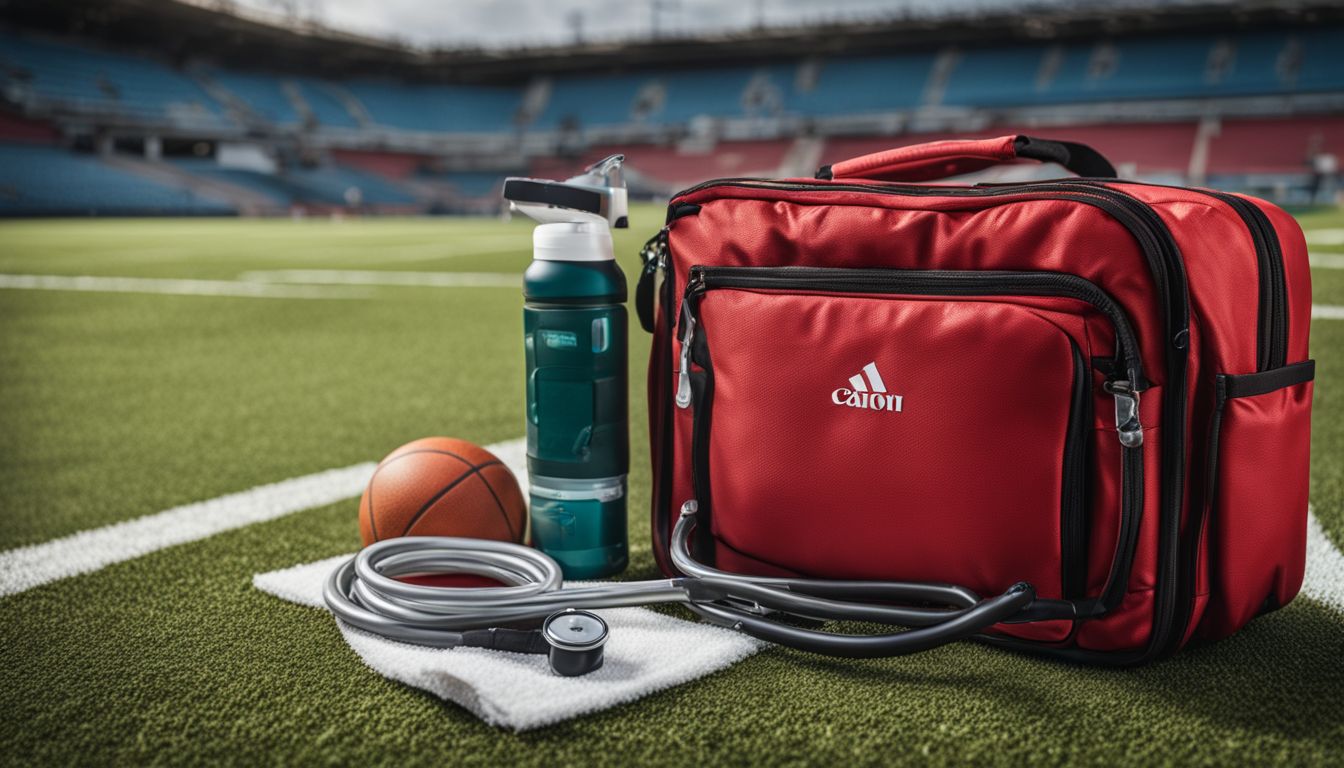How To Become A Sports Medic
Many dream about helping athletes stay at their best. Being a sports medicine doctor is key to this goal. This article will guide you on the journey from education to career. Let’s get started!
What is a Sports Medicine Doctor?

A sports medicine doctor examines and diagnoses patients with sports-related injuries. They develop treatment plans and monitor fitness to aid recovery.
https://www.youtube.com/watch?v=fSNTv_-nOwQ
Role and duties
Sports medicine doctors have many important jobs. They see patients to find out what injuries or health problems they have. This could be anything from sprains to concussions. Using their training, they figure out the best treatment plans to help these patients get better.
These treatments might include physical therapy, exercise medicine, or sometimes surgery for more serious cases.
They also keep an eye on how fit and healthy people are, especially athletes, to prevent future injuries. By monitoring their fitness and giving advice on things like hydration and exercise routines, they play a big role in keeping athletes at the top of their game.
Knowing about different medical fields helps them treat a wide range of sports-related injuries effectively. Now let’s look into what you need to do if you want to become a sports medicine doctor.
Examining and diagnosing patients
Sports medicine doctors use physical exams to check on their patients. They look for problems like tendinopathy or dislocations. These checks help them understand the patient’s health and find any sports injuries.
They often ask about pain and how it affects daily life. This helps them make the right diagnosis.
They also might use tests like X-rays or MRI scans to see inside the body. These pictures can show things like osteoarthritis or other internal issues not visible from the outside.
After finding out what’s wrong, they think about the best way to treat it. Next, they work on developing treatment plans that fit each patient’s needs.
Developing treatment plans
After figuring out what’s wrong with a patient, the next step is coming up with a way to help them get better. This means making a plan for treatment. Doctors in sports medicine use their knowledge of injury prevention and recovery to create these plans.
They think about the type of sport, the athlete’s body, and how severe the injury is.
They might suggest physical therapy or exercises that can make muscles stronger and prevent future injuries. Sometimes, they recommend treatments like injecting platelet-rich plasma to speed up healing in damaged areas.
Each plan aims to get athletes back in action safely and as quickly as possible without risking more harm.
Monitoring fitness
Once a treatment plan is in place, sports doctors turn their attention to monitoring fitness. They keep an eye on how well athletes are following their exercise and recovery programs.
Sports physicians use tools like heart rate monitors and activity trackers to watch progress closely. These devices help them see if the athlete’s health and fitness levels are improving.
Sports medicine experts also check for any signs of overtraining or injury during follow-ups. They make sure athletes are not pushing too hard and risking harm. By keeping track of changes in physical condition, sports doctors adjust treatments as needed to ensure safe, effective recovery and performance enhancement.
Requirements to Become a Sports Medicine Doctor

Becoming a Sports Medicine Doctor requires completing A-levels, obtaining a degree in medicine, and developing necessary skills. To find out more about the training pathways and additional guidance for this career, keep reading.
Completing A-levels
You need good grades in your A-levels to study medicine at university. Focus on science subjects like biology and chemistry. Maths and physics are also helpful. These subjects prepare you for a medical degree.
Universities look at your A-level results. Good scores improve your chances of getting into medical school. Work hard and aim for high marks in your exams.
Obtaining a degree in medicine
After finishing A-levels, the next step is to get a medical degree from a university. This requires applying through UCAS and often taking an exam like the BMAT or UKCAT. It’s important to choose courses that lead to becoming a doctor, such as general medicine or biomedical sciences.
Studying for a medical degree takes about five years. During this time, students learn lots of things about the human body and how to treat illnesses. They attend lectures, work in labs, and get hands-on experience in hospitals under the guidance of experienced doctors.
After graduating with their degree, they’re ready for more training in specific areas of medicine like sports and exercise medicine (SEM) or orthopaedic surgery if they want to become sports medics.
Completing residency and fellowship
To become a sports medicine doctor, you must finish both residency and fellowship. This is how you get the experience needed to help athletes.
- After getting your medical degree, apply for a residency programme in areas like family medicine, emergency medicine, or internal medicine. This step is crucial as it lays the foundation for your career in sports medicine.
- During your residency, which lasts about three to four years, you will work in hospitals and clinics. Here, you learn by treating patients under the guidance of experienced doctors.
- Look for opportunities to focus on sports – related cases during your residency. This might include helping athletes with injuries or providing sideline medical care at sporting events.
- After completing your residency, pass the exams required by the General Medical Council (GMC) to officially become a doctor in your chosen field.
- Next, apply for a fellowship in sport and exercise medicine (SEM). These programmes are more specialised and usually last one or two years.
- Your fellowship focuses on sports pathology and injuries, preventative medicine relevant to physical activity, and dealing with chronic conditions that affect athletes.
- You’ll also learn about orthopaedic surgery basics and how osteopathic medicine ties into treating sports injuries.
- Participate in clinical trials if possible during your fellowship. It’s a good way to contribute to research in sports medicine while gaining valuable experience.
- Attend workshops and seminars offered by SEM organisations or health services focused on sports medicine to broaden your knowledge even further.
- Finally, keep updating your skills through continuous education courses after finishing your fellowship. Medicine always evolves, especially fields like SEM that blend healthcare with physical activity demands.
Developing necessary skills
To become a sports medicine doctor, you need to develop excellent communication and interpersonal skills. You also require strong problem-solving abilities and the capacity to stay calm in high-pressure situations.
Proficiency in teamwork, leadership, and decision-making is essential for this role.
After acquiring the necessary skills, prospective doctors can explore different training pathways and additional guidance options to progress towards becoming a sports medicine specialist.
Training Pathways and Additional Guidance
Begin by exploring postgraduate courses in sports and exercise medicine. Gain insights into the FAQs for overseas doctors pursuing a career in sports medicine.
Postgraduate courses in SEM
Postgraduate courses in SEM offer specialised training for aspiring sports medicine doctors. These courses provide in-depth knowledge and hands-on experience in the field, equipping students with the expertise required to excel in sports and exercise medicine. The curriculum includes:
- Comprehensive study of sports injuries and their management
- Practical training in diagnostic techniques relevant to sports medicine, such as musculoskeletal ultrasound and MRI interpretation
- Exposure to different approaches for managing chronic diseases related to physical activity
- Application of sports psychology principles to aid athletes in performance enhancement
- Training on the use of prolotherapy and other advanced medical interventions for sports injuries
These postgraduate courses pave the way for doctors to become proficient specialists in sport & exercise medicine, preparing them for a rewarding career in this dynamic field.
FAQ’s for overseas doctors
When working as a sports medicine doctor in the UK, overseas doctors may have various questions. Here are some frequently asked questions and their answers:
- Can overseas doctors practise sports medicine in the UK?
- Yes, overseas doctors can practise sports medicine in the UK if they meet the necessary requirements and are registered with the General Medical Council (GMC).
- Overseas doctors need to demonstrate their qualifications, English language proficiency, and relevant experience. They may also need to pass the Professional and Linguistic Assessments Board (PLAB) test.
- Yes, overseas doctors can pursue specialisation in sports medicine through postgraduate training programmes or fellowships offered by reputable institutions.
- Overseas doctors who fulfil the registration and licensing requirements can work in both public healthcare institutions such as the NHS and private clinics or hospitals.
- Overseas doctors may need to undertake specific assessments or exams related to sports medicine, depending on their area of specialisation and professional goals.
- Various support networks, mentoring programmes, and professional associations exist to assist overseas doctors in acclimating to the UK healthcare system and advancing their careers.
- Overseas doctors have access to ongoing professional development opportunities through courses, conferences, and workshops focused on sports medicine advancements and best practices.
Remember that each country’s regulations might vary concerning the practice of sports medicine by international medical professionals.
Career Opportunities and Benefits
Opportunities in the NHS, private practice, sports organisations and the military. Varied career paths and benefits.
Working in the NHS
To work in the NHS, medical professionals can apply for various roles such as a general practitioner, consultant, or healthcare specialist. They provide patient care in primary and secondary care settings, including A&E and health clinics.
This involves diagnosing illnesses, managing chronic conditions, and reviewing medical records. Additionally, they collaborate with physiotherapists and orthopedic surgeons to develop treatment plans for sports injuries.
The opportunities within the NHS offer diverse experiences from clinical rotations to specialising in areas like sports cardiology. Though it may involve long hours and demanding surgical procedures at times, the reward lies in making a tangible difference to patients’ lives through quality healthcare delivery.
Private practice
Private practice in sports medicine offers independence and control over the type of patients seen and treatment methods used. It allows for a flexible schedule, potential financial rewards, and the chance to build a loyal client base.
However, starting a private practice requires careful planning, significant investment, and effective marketing strategies to attract clients.
Considering setting up your own space? Here’s how to make it happen!
In sports organisations
Sports medicine doctors in sports organisations work alongside athletes to prevent, diagnose, and treat injuries. They provide medical care on the field during games and practices.
Their role involves collaborating with coaches, trainers, and other healthcare specialists to ensure athletes receive comprehensive care.
These professionals must have a thorough understanding of sports-related injuries and treatments. They also play a crucial part in developing injury prevention programs tailored for individual athletes or entire teams.
Military
Military doctors in sports medicine can serve in various roles, from working with professional athletes to supporting military personnel. They are responsible for providing medical care and overseeing the physical fitness of service members.
These doctors may also contribute to research and development of exercise programs aimed at enhancing performance and preventing injuries within the armed forces.
Joining the military as a sports medicine doctor offers opportunities to work closely with elite units, promote health and wellness, and contribute valuable expertise towards maintaining peak physical readiness among service members Keywords: Armed Forces, Medical Corps, Physical Fitness, Elite Units
Benefits and challenges
Working as a sports medicine doctor offers opportunities to work in diverse settings, such as the NHS, private practice, or with sports organisations. This provides variety and excitement in daily tasks.
However, it also brings challenges of dealing with high-pressure situations like cardiac arrest during sporting events.
Sports medicine doctors face the benefit of working closely with athletes and helping them achieve their peak performance while addressing injuries effectively. Nevertheless, they encounter the challenge of high expectations for quick results and constant pressure to stay updated on advancements in sports medicine.
Conclusion
Becoming a sports medic requires dedication and hard work. The journey involves completing A-levels, earning a medical degree, and gaining residency experience. This opens doors to various career paths in the NHS, private practice, sports organisations, and even the military.
The road may be challenging but promises fulfilling opportunities to make a difference in athletes’ lives.
FAQs
1. What do I need to study to become a sports medic?
You should start with an undergraduate medical degree from a medical university, followed by core medical training and possibly specialising in sports medicine after.
2. How long does it take to train as a sports medic?
After getting your GCSEs, you’ll spend years studying for your medical degree, then complete foundation training and additional residency training focused on sport medicine.
3. Do I need any specific exams to get into medical school for sports medicine?
Yes, you might have to pass the Biomedical Admissions Test (BMAT) or similar exams required by university admissions for medical schools.
4. Can physiotherapy lead me into a career in sports medicine?
Absolutely! Starting with physiotherapy can be a great first step; later, you can pursue further studies or residencies in sport medicine.
5. Are there famous sports medics I can look up to?
Hans-Wilhelm Muller-Wohlfahrt is well-known in the field of sports medicine; his career could provide inspiration and insight into what achieving at the highest level looks like.

